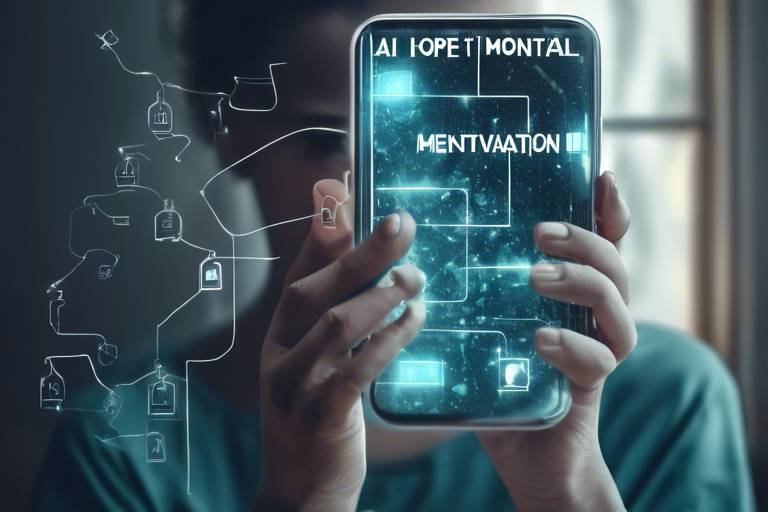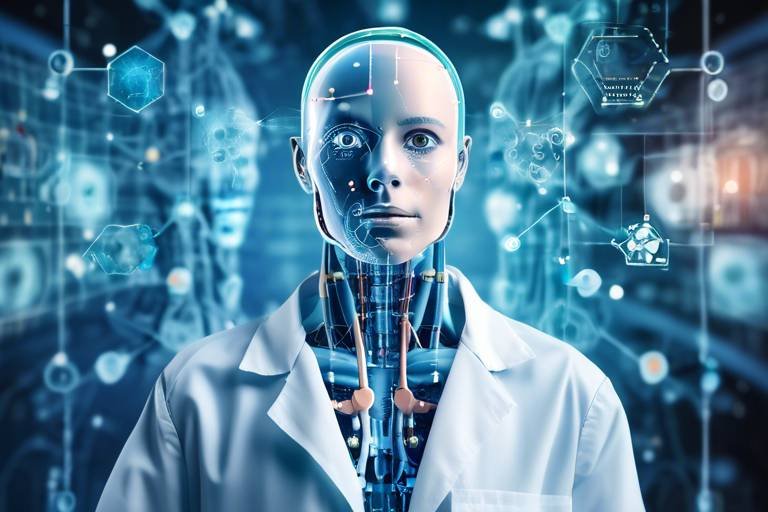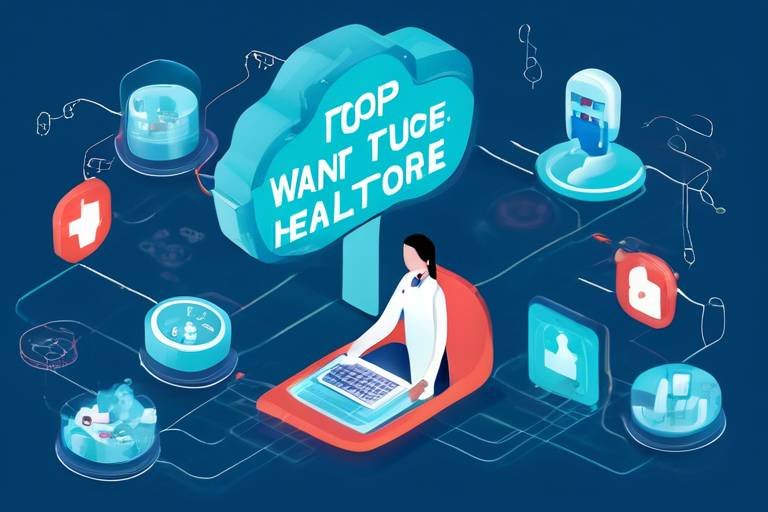AI Innovations in Mental Health Care: Hope for the Future
In recent years, the landscape of mental health care has undergone a remarkable transformation, largely due to the integration of artificial intelligence (AI). This groundbreaking technology is not just a buzzword; it’s becoming a pivotal ally for mental health professionals and patients alike. Imagine a world where your therapist is available at the click of a button, providing support whenever you need it. That’s the promise of AI in mental health care. From enhancing diagnostic accuracy to personalizing treatment plans, AI is reshaping how we approach mental health.
As we dive deeper into this topic, it’s essential to understand what AI really means in the context of mental health. At its core, AI encompasses a variety of technologies, including machine learning and natural language processing, which enable computers to learn from data and interact with humans in a more intuitive way. This isn’t just about robots taking over therapy sessions; it’s about leveraging data to provide tailored support for individuals struggling with mental health issues.
One of the most exciting aspects of AI in mental health care is its potential to bridge gaps in accessibility. For many, reaching out for help can feel daunting. However, AI tools, such as chatbots and predictive analytics, can provide immediate support and insights into mental health trends. This is particularly crucial in a world where mental health issues are on the rise, and traditional therapy options may not be available to everyone.
But let’s not get ahead of ourselves. While the benefits are significant, there are also challenges and ethical considerations that come into play. For instance, how do we ensure that AI systems are free from bias? What measures are in place to protect sensitive patient data? These questions are vital as we navigate this new frontier in mental health care.
Overall, the innovations brought forth by AI in mental health care are a beacon of hope for the future. With continuous advancements, we can expect to see even more sophisticated tools that not only enhance therapy but also empower individuals to take charge of their mental health journey. As we explore the various facets of AI in this article, it’s clear that the future of mental health care is not just bright; it’s intelligent.
- What is AI's role in mental health care? AI helps in diagnosing conditions, personalizing treatment plans, and providing support through tools like chatbots.
- Are AI chatbots effective in providing mental health support? Yes, they offer 24/7 assistance and can help reduce barriers to accessing care, although they have limitations in understanding complex emotions.
- What are the ethical concerns surrounding AI in mental health? Key concerns include patient consent, data privacy, and the potential for bias in AI algorithms.
- How does predictive analytics work in mental health? Predictive analytics uses data to identify trends and risks, helping to inform preventive measures for at-risk individuals.

Understanding AI in Mental Health
Artificial intelligence (AI) is not just a buzzword; it’s a revolutionary force that’s reshaping the landscape of mental health care. Imagine having a tool that can analyze vast amounts of data to help diagnose mental health conditions more accurately than ever before. That’s precisely what AI brings to the table. By utilizing algorithms and machine learning, AI systems can sift through patient information, identifying patterns and predicting outcomes that might be missed by even the most experienced professionals. This capability allows for a more nuanced understanding of mental health issues, paving the way for tailored treatment plans that resonate with individual needs.
At its core, AI in mental health care encompasses various technologies and methodologies. One of the primary applications is in the realm of diagnosis. For instance, AI can analyze speech patterns, facial expressions, and even social media activity to detect signs of mental health disorders. This is akin to having a super-sleuth on your side, piecing together clues that reveal a person’s emotional state. Moreover, AI can also assist in treatment by providing data-driven insights that help therapists adjust their approaches based on real-time feedback. This dynamic interplay between AI and mental health professionals enhances the therapeutic experience, making it more effective and responsive.
To better understand how AI operates within mental health care, let's break down its key components:
- Data Collection: AI systems gather data from various sources, including clinical records, patient surveys, and even wearable technology.
- Data Analysis: Advanced algorithms analyze the collected data to identify trends, correlations, and potential risk factors.
- Predictive Modeling: AI can create models that predict future mental health issues based on historical data, helping in early intervention.
While the benefits of AI are immense, it’s crucial to recognize that the technology is still evolving. There are ongoing discussions about how to best integrate these tools into traditional mental health care practices without compromising the human touch that is vital in therapy. The goal is not to replace therapists but to augment their capabilities, providing them with powerful insights that can lead to better patient outcomes. As we continue to explore the potential of AI in mental health, it’s essential to keep the conversation going, ensuring that both patients and professionals are on board with these innovations.

Benefits of AI in Therapy
Artificial Intelligence (AI) is not just a buzzword; it’s a game changer in the realm of therapy. Imagine walking into a therapist's office and having a personalized treatment plan that adapts to your unique needs, all thanks to cutting-edge AI technology. This innovation is enhancing therapeutic practices by providing tailored solutions that cater to individual circumstances. One of the most significant benefits of AI in therapy is its ability to analyze vast amounts of data, which can lead to more effective treatment plans. By leveraging data from various sources, AI can identify patterns that human therapists might overlook, ensuring that patients receive the most appropriate care.
Moreover, AI technologies facilitate continuous monitoring of patients’ progress. Through wearable devices and mobile applications, therapists can track their patients' mental health metrics in real-time. This ongoing assessment allows for timely adjustments to treatment plans, ensuring that patients are always on the path to recovery. For instance, if a patient shows signs of increased anxiety through their app data, a therapist can proactively reach out and modify the treatment approach. This level of responsiveness can significantly enhance patient outcomes and foster a stronger therapeutic alliance.
Additionally, AI can help bridge the gap between patients and mental health resources. Many individuals are hesitant to seek help due to stigma or lack of accessibility. AI-driven platforms can provide a safe space for individuals to explore their mental health concerns without fear of judgment. For example, AI chatbots can offer immediate support, guiding users through coping strategies and mindfulness exercises. This not only empowers individuals to take charge of their mental health but also encourages them to seek professional help when necessary.
However, it’s essential to recognize that while AI brings numerous benefits, it is not a replacement for human therapists. Instead, it acts as a supplementary tool that enhances the therapeutic experience. By automating routine tasks and providing data-driven insights, therapists can focus more on the human aspects of therapy, such as empathy and understanding. In this way, AI is not just improving outcomes; it’s enriching the overall therapeutic experience.
In summary, the integration of AI in therapy presents a multitude of advantages, including:
- Personalization: Tailored treatment plans based on individual data.
- Continuous Monitoring: Real-time assessment of patient progress.
- Accessibility: Reducing barriers to mental health support through AI-driven platforms.
- Enhanced Therapist Focus: Allowing therapists to concentrate on emotional and relational aspects of care.
As we look forward, the potential for AI in therapy is immense. With ongoing advancements, we can expect even more innovative solutions that will not only improve patient outcomes but also revolutionize how therapy is delivered.

Chatbots as Support Tools
In recent years, AI-driven chatbots have emerged as a revolutionary force in the realm of mental health support. These digital companions are designed to provide immediate assistance, making them a vital resource for individuals seeking help. Imagine having a friend who is always available, ready to listen without judgment, and equipped with tools to guide you through your toughest moments. That’s what chatbots offer—a sense of companionship and support at any hour of the day or night.
One of the standout features of chatbots is their ability to provide 24/7 accessibility. This means that no matter when you feel overwhelmed or anxious, you can reach out for help without waiting for an appointment or feeling the pressure of a traditional therapy session. This is particularly beneficial for those who may not have immediate access to mental health professionals or who might feel uncomfortable seeking help in person. By using chatbots, individuals can engage in therapeutic conversations and receive coping strategies at their convenience, making mental health care more approachable and less intimidating.
Moreover, chatbots can be tailored to meet individual needs. Through machine learning algorithms, they can analyze user interactions and adapt their responses accordingly. This personalization enhances the therapeutic experience, allowing users to feel understood and supported in a way that feels unique to them. For example, if a user frequently expresses feelings of anxiety, the chatbot can learn to provide resources and techniques specifically aimed at managing anxiety, creating a more effective support system.
However, it's essential to acknowledge that while chatbots are a fantastic tool for immediate support, they do come with limitations. One major challenge is their inability to fully grasp complex emotional nuances. Unlike human therapists who can pick up on subtle cues and respond with empathy, chatbots often rely on programmed responses that may not capture the depth of human emotions. This raises questions about the effectiveness of chatbots in handling severe mental health crises where human intervention is crucial.
In summary, chatbots serve as valuable support tools in mental health care by providing immediate assistance, enhancing accessibility, and offering personalized interactions. They can bridge the gap for individuals who might otherwise struggle to seek help. However, it’s important to remember that while they can be a helpful resource, they are not a replacement for professional mental health care, especially in more severe cases. As we continue to explore the potential of AI in mental health, the integration of chatbots into therapeutic practices will undoubtedly evolve, offering exciting possibilities for the future.
- What are chatbots in mental health care? Chatbots are AI-driven tools designed to provide immediate support and resources to individuals experiencing mental health challenges.
- How do chatbots work? They utilize machine learning algorithms to analyze user interactions and provide personalized responses based on the individual's needs.
- Can chatbots replace human therapists? While chatbots can offer valuable support, they are not a substitute for professional therapy, especially in severe cases.
- Are chatbots available 24/7? Yes, one of the key advantages of chatbots is their availability around the clock, providing support whenever needed.

Accessibility and Convenience
In today's fast-paced world, accessibility and convenience are paramount, especially when it comes to mental health care. Imagine being in a situation where you feel overwhelmed, anxious, or just need someone to talk to—but it's the middle of the night, and your therapist's office is closed. This is where AI-driven chatbots come into play, transforming the landscape of mental health support. These digital companions are available 24/7, offering immediate assistance at the click of a button. No more waiting weeks for an appointment or feeling hesitant to reach out for help. With chatbots, support is just a message away.
One of the most significant advantages of chatbots is their ability to provide a safe space for individuals to express their feelings without the fear of judgment. This anonymity can encourage more people to seek help, especially those who might be reluctant to visit a therapist in person. The convenience of accessing mental health support from the comfort of one’s home can be a game changer. For instance, someone struggling with social anxiety might find it easier to interact with a chatbot rather than face-to-face with a human therapist. The chatbots can engage users in conversations about their emotions, provide coping strategies, and even offer resources for further help.
Moreover, the integration of AI in mental health care can lead to more personalized experiences. Chatbots can learn from user interactions, adapting their responses to better suit individual needs over time. This level of customization means that the support offered is not just generic advice but tailored to the specific challenges the user faces. Imagine a scenario where a chatbot remembers your previous conversations and can follow up on your progress or suggest new techniques based on your past interactions. This kind of continuity in care can significantly enhance the therapeutic experience.
However, while the accessibility and convenience of AI chatbots are impressive, it's essential to recognize that they are not a replacement for professional help. They should be viewed as an adjunct to traditional therapy—an additional resource that can bridge the gap between sessions or provide immediate support when needed. The goal is to empower individuals to take charge of their mental health, making resources available at their fingertips.
In conclusion, the accessibility and convenience offered by AI-driven chatbots in mental health care are revolutionizing how individuals seek and receive support. By providing immediate, personalized assistance, these tools are breaking down barriers and encouraging more people to engage with mental health resources. As technology continues to evolve, we can expect even more innovative solutions that will enhance the mental health landscape.
- How do AI chatbots work in mental health care?
AI chatbots use natural language processing and machine learning to understand user inputs and provide relevant responses based on their programming and learning algorithms. - Are chatbots a substitute for professional therapy?
No, chatbots are designed to complement traditional therapy and provide immediate support, but they do not replace the need for professional mental health care. - Can chatbots really help with serious mental health issues?
While chatbots can offer support and guidance, they are not equipped to handle severe mental health crises. It's crucial to seek professional help in such cases. - How can I ensure my data is safe when using AI chatbots?
Always choose chatbots from reputable sources that prioritize user privacy and data protection. Read their privacy policies to understand how your information is handled.

Limitations of Chatbots
While AI-driven chatbots have undoubtedly made significant strides in providing mental health support, they are not without their limitations. One of the most pressing issues is their inability to fully grasp the intricate nuances of human emotions. Imagine trying to explain a complex feeling like anxiety or depression to a friend who has never experienced it; similarly, chatbots often struggle to interpret emotional subtleties that a trained therapist would easily recognize. This gap can lead to misunderstandings and potentially inadequate support for users seeking help.
Moreover, chatbots are primarily programmed to respond based on predefined algorithms and databases. While they can provide general advice or coping mechanisms, they often lack the personalization that human therapists offer. Each person’s mental health journey is unique, and a one-size-fits-all approach may not address individual needs effectively. For instance, a chatbot might suggest breathing exercises for someone experiencing panic attacks, but it may not recognize that the individual requires a more tailored approach, such as exploring past trauma or specific triggers.
Another limitation is the chatbots' dependency on data input. Users might not always provide complete or accurate information due to various reasons, such as fear of judgment or misunderstanding the questions posed. This can result in the chatbot delivering responses that are irrelevant or unhelpful. Furthermore, when users are in distress, they may not articulate their feelings clearly, which can lead to a breakdown in communication between the user and the chatbot.
Additionally, there are significant concerns regarding the ethical implications of relying on chatbots for mental health support. Users may develop a false sense of security, thinking that chatbots can replace human interaction and professional help. This misconception can deter individuals from seeking necessary therapy or counseling from qualified professionals, ultimately hindering their recovery process.
In summary, while chatbots serve as an innovative tool in mental health care, it is essential to acknowledge their limitations. They can be a valuable resource for immediate support but should not be viewed as a substitute for comprehensive mental health care provided by trained professionals. As we continue to integrate AI into our daily lives, understanding these limitations will help ensure that we use technology responsibly and effectively.
- Can chatbots replace human therapists? No, chatbots can provide immediate support but should not replace the nuanced care provided by human therapists.
- Are chatbots effective for everyone? While many users find chatbots helpful, their effectiveness can vary based on individual needs and circumstances.
- How do chatbots handle sensitive information? Most reputable chatbots prioritize user privacy, but it's crucial to verify their data protection policies before sharing personal information.
- What should I do if a chatbot isn't helping? If you find that a chatbot isn't meeting your needs, consider seeking help from a licensed mental health professional.

Predictive Analytics in Mental Health
Predictive analytics is like having a crystal ball for mental health care; it allows professionals to foresee potential issues before they escalate. By leveraging vast amounts of data, AI can analyze patterns and trends that may indicate an individual is at risk for mental health disorders. This proactive approach is not just revolutionary; it’s a game changer that could redefine how we understand and treat mental health. Imagine being able to identify someone who may be struggling with depression or anxiety even before they recognize it themselves. This is the power of predictive analytics!
At its core, predictive analytics involves the use of algorithms and statistical models to analyze historical data and predict future outcomes. In the context of mental health, this means examining data from various sources, such as electronic health records, social media activity, and even wearable devices that track physiological responses. By integrating these data points, AI can create a comprehensive profile of an individual's mental health, which can be used to flag potential risks.
For instance, let’s consider a scenario where an individual’s social media posts reflect increasing levels of distress or isolation. Predictive analytics can identify these patterns and alert healthcare providers, who can then reach out to offer support before the situation worsens. This kind of early intervention is crucial; it can prevent crises and reduce the need for more intensive treatments later on.
However, the implementation of predictive analytics in mental health care isn't without its challenges. There are ethical considerations and privacy concerns that must be addressed. For example, how do we ensure that the data used for predictions is accurate and free from bias? And how do we protect individuals' sensitive information while still utilizing it to improve their care? These are questions that healthcare professionals and technologists must grapple with as they explore the potential of AI in mental health.
Moreover, the effectiveness of predictive analytics hinges on the quality of the data collected. If the data is flawed or incomplete, the predictions made could lead to misguided interventions. Therefore, it’s essential to have robust data collection and analysis methods in place. Collaboration between mental health professionals, data scientists, and patients will be crucial in refining these predictive models.
In conclusion, predictive analytics holds immense promise for the future of mental health care. By harnessing the power of data, we can not only identify at-risk individuals but also inform preventive measures that can lead to better outcomes. As technology continues to advance, the integration of predictive analytics into mental health practices could pave the way for a more proactive and personalized approach to mental health care.
- What is predictive analytics in mental health?
Predictive analytics in mental health refers to the use of data analysis techniques to forecast potential mental health issues and inform preventive measures. - How does AI help in identifying at-risk individuals?
AI analyzes vast amounts of data, including behavioral patterns and historical records, to identify individuals who may be at risk for mental health disorders. - What are the ethical concerns surrounding predictive analytics?
Ethical concerns include data privacy, consent, and the potential for bias in the algorithms used to make predictions. - Can predictive analytics replace traditional therapy?
No, predictive analytics is a tool to enhance traditional therapy, not a replacement. It aids in early identification and intervention.

Challenges in Implementing AI
While the promise of AI in mental health care is incredibly exciting, it doesn't come without its fair share of challenges. One of the most pressing issues is the ethical considerations that arise when integrating AI technologies into patient care. For instance, questions about consent are paramount. How do we ensure that patients are fully informed about how their data will be used? Moreover, there's the risk of bias in AI algorithms, which can lead to unequal treatment outcomes. If the data used to train these systems is not representative of diverse populations, we could see disparities in care, which is the last thing we want in a field as sensitive as mental health.
Another significant hurdle is data privacy concerns. The mental health sector deals with some of the most sensitive information imaginable. Patients often share deeply personal experiences, and ensuring that this data remains confidential is crucial. For AI to thrive in this space, it must be built on a foundation of trust. Patients need to feel secure that their information won't be misused or fall into the wrong hands. This means implementing robust security measures and being transparent about data handling practices.
Moreover, the integration of AI into existing healthcare systems can be a complex process. Many mental health professionals are already stretched thin, and adding new technologies to their workload can be daunting. There’s often a steep learning curve involved, which can lead to resistance among practitioners who might feel overwhelmed by the prospect of adopting AI tools. Training programs and support systems will be essential to help professionals navigate this transition smoothly.
Furthermore, the regulatory landscape surrounding AI in healthcare is still evolving. Policymakers are grappling with how to create guidelines that protect patients while fostering innovation. This can lead to uncertainty, making it difficult for organizations to invest in AI technologies without knowing the rules of the game. As regulations catch up with technological advancements, there will need to be a balance between ensuring patient safety and encouraging innovation.
In summary, while the potential for AI to transform mental health care is enormous, the challenges it faces are equally significant. Addressing ethical concerns, ensuring data privacy, facilitating integration into current practices, and navigating regulatory issues will be crucial for the successful implementation of AI in this vital field.
- What are the ethical concerns regarding AI in mental health?
Ethical concerns include issues of consent, bias in algorithms, and the potential for unequal treatment outcomes. - How can data privacy be ensured in AI applications?
Robust security measures and transparency about data handling practices are essential to protect sensitive patient information. - What challenges do mental health professionals face when adopting AI?
Many professionals may feel overwhelmed by the learning curve associated with new technologies, leading to resistance to adoption. - How is the regulatory landscape evolving for AI in healthcare?
Policymakers are working to create guidelines that protect patients while fostering innovation, but uncertainty remains a challenge.

Ethical Considerations
As we dive deeper into the integration of artificial intelligence in mental health care, it's essential to pause and reflect on the that arise. The potential benefits of AI are enormous, but they come with a set of complex ethical dilemmas that can’t be ignored. One of the primary concerns is the issue of informed consent. Patients may not fully understand how their data is being used or the implications of AI-driven therapies. It's crucial that mental health professionals ensure that patients are not only informed but also comfortable with how their information is processed and utilized.
Moreover, there's the issue of bias in AI algorithms. If the data used to train these systems is not representative of diverse populations, it can lead to biased outcomes that may disproportionately affect certain groups. For instance, an AI system trained primarily on data from one demographic might fail to provide accurate assessments or recommendations for individuals from different backgrounds. This raises questions about fairness and equity in mental health care, making it imperative for developers to prioritize diversity in data collection.
Additionally, the transparency of AI systems is another ethical concern. Patients and practitioners alike should have insight into how AI makes decisions. If a system suggests a certain treatment plan or diagnosis, understanding the reasoning behind it can foster trust and collaboration between patients and healthcare providers. Without this transparency, there’s a risk of creating a disconnect, where patients feel like they are being treated by a 'black box' rather than a supportive partner in their mental health journey.
Lastly, we must consider the implications of automation in mental health care. While AI can enhance efficiency and accessibility, it can also lead to a reduction in human interaction, which is often vital in therapeutic settings. The therapeutic alliance—the bond between therapist and patient—is a cornerstone of effective treatment. If AI begins to replace human contact, we must ask ourselves: can a machine ever truly understand and respond to the complexities of human emotion?
In conclusion, while AI holds great promise for the future of mental health care, it is crucial to navigate these ethical waters carefully. Addressing these considerations will not only enhance the effectiveness of AI technologies but also ensure that they are implemented in a way that respects and protects the rights and well-being of patients.
- What are the main ethical concerns regarding AI in mental health care?
The main concerns include informed consent, bias in algorithms, transparency of AI decision-making, and the potential reduction of human interaction in therapy. - How can we ensure that AI systems in mental health care are unbiased?
By using diverse datasets for training AI systems and continuously monitoring their outcomes across different demographics. - Is it safe to rely on AI for mental health diagnoses?
AI can assist in diagnosis but should complement, not replace, professional human judgment and interaction. - What role does transparency play in AI applications?
Transparency helps build trust between patients and AI systems, allowing patients to understand how decisions are made.

Data Privacy Concerns
In the rapidly evolving landscape of mental health care, the integration of artificial intelligence (AI) brings with it a host of that cannot be overlooked. As AI systems increasingly rely on vast amounts of personal data to function effectively, the question of how this information is collected, stored, and utilized becomes paramount. Patients seeking mental health support often share sensitive information, making it crucial for healthcare providers to ensure that their data is handled with the utmost care.
One of the primary concerns is the potential for data breaches. With the rise of cyberattacks, the risk of unauthorized access to sensitive patient information is a pressing issue. Imagine a scenario where a patient's private conversations with an AI-driven chatbot are leaked online; the repercussions could be devastating, not only for the individual but also for the credibility of the healthcare provider. Therefore, implementing robust security measures is essential to protect patient data from such threats.
Moreover, there are significant ethical implications surrounding the use of AI in mental health care. Patients must provide consent for their data to be used, but how informed can they truly be when the technology is constantly evolving? This raises questions about whether individuals fully understand what they’re agreeing to when they use AI-based services. It's crucial for healthcare providers to ensure transparency in their data collection processes, so patients can make informed choices about their privacy.
To further complicate matters, AI systems can inadvertently introduce bias into mental health care. If the data used to train these systems is skewed or unrepresentative, the AI might produce results that are not only inaccurate but also discriminatory. This could lead to misdiagnoses or inappropriate treatment recommendations, further endangering patient trust. Addressing bias in AI algorithms is not just a technical challenge; it's a moral imperative that directly impacts patient care.
As healthcare providers navigate these challenges, they must also adhere to various regulatory frameworks designed to protect patient data. Laws such as the Health Insurance Portability and Accountability Act (HIPAA) in the United States set strict guidelines on how patient information should be handled. However, as AI technology continues to advance, existing regulations may need to be updated to address new risks and ensure that patient privacy remains a priority.
In conclusion, while AI holds incredible potential for enhancing mental health care, it is accompanied by significant data privacy concerns that must be addressed. By prioritizing security, ensuring transparency, combating bias, and adhering to regulatory standards, the mental health sector can harness the benefits of AI while safeguarding the privacy of those it aims to help.
- What are the main data privacy concerns related to AI in mental health? The main concerns include data breaches, ethical implications of consent, bias in AI algorithms, and compliance with regulatory frameworks.
- How can healthcare providers ensure data privacy? By implementing robust security measures, ensuring transparency in data collection, and adhering to regulatory guidelines.
- What happens if patient data is breached? A data breach can lead to unauthorized access to sensitive information, potentially harming patients and damaging the credibility of healthcare providers.
- Are there laws protecting patient data in AI applications? Yes, laws like HIPAA exist to protect patient data, but they may need updates as technology evolves.

The Future of AI in Mental Health
The horizon of mental health care is brightening with the integration of artificial intelligence (AI). As we look towards the future, it’s clear that AI will play a pivotal role in reshaping how we approach mental health treatment and support. Imagine a world where mental health professionals are empowered by AI tools that not only enhance their capabilities but also provide deeper insights into patient care. This is not just a dream; it's becoming a reality.
One of the most exciting prospects is the development of adaptive learning algorithms that can tailor treatment plans to individual needs. These algorithms analyze a patient’s progress in real-time, allowing for adjustments in therapy that can lead to better outcomes. For instance, if a patient is responding well to a specific type of therapy, the AI can recommend increasing the frequency of sessions or integrating complementary techniques. This level of personalization is akin to having a fitness trainer who adjusts your workout based on your performance each week—only this trainer is powered by data and advanced analytics.
Furthermore, the future of AI in mental health is likely to see an explosion of wearable technology that monitors physiological indicators of mental health, such as heart rate variability and sleep patterns. These devices can provide invaluable data that, when analyzed by AI, can predict potential mental health crises before they escalate. Imagine receiving an alert on your phone suggesting you take a moment to practice mindfulness based on your stress levels detected throughout the day. This proactive approach could revolutionize mental health care by preventing issues before they become severe.
However, it’s not just about technology; it’s also about collaboration. The future will likely see an increase in partnerships between tech companies and mental health organizations. This collaboration can lead to the development of comprehensive platforms that combine AI-driven insights with human empathy and understanding. For example, a platform could integrate therapy sessions with AI analytics, allowing therapists to focus on the emotional aspects of treatment while the AI handles the data-driven insights. This dual approach could enhance the therapeutic alliance, making therapy more effective and engaging.
That said, as we embrace these innovations, it’s essential to remain vigilant about the ethical implications. The future of AI in mental health must prioritize transparency and accountability. Patients should be informed about how their data is used and the algorithms that inform their treatment. Trust is paramount in the therapeutic relationship, and maintaining it will be crucial as we navigate this new landscape.
In summary, the future of AI in mental health care is filled with promise and potential. With innovations that enhance personalized care, predictive analytics, and collaborative platforms, we are on the brink of a new era in mental health treatment. The key will be to balance these technological advancements with ethical considerations, ensuring that patient care remains at the forefront of this evolution.
- How will AI change the way mental health professionals work?
AI will assist professionals by providing data-driven insights, allowing them to focus more on the emotional and interpersonal aspects of therapy. - Are AI chatbots effective in providing mental health support?
While they offer immediate assistance and accessibility, they may struggle with understanding complex emotional nuances. - What ethical concerns are associated with AI in mental health?
Ethical concerns include issues of consent, data privacy, and the potential for bias in AI algorithms. - Will AI replace human therapists?
AI is designed to augment the work of human therapists, not replace them. The human touch remains essential in mental health care.
Frequently Asked Questions
- What is AI's role in mental health care?
AI is transforming mental health care by providing innovative tools for diagnosis and treatment. It helps in personalizing therapy, predicting mental health trends, and offering support through chatbots, making care more accessible and efficient.
- How do AI-driven chatbots support mental health?
AI-driven chatbots offer 24/7 support, providing immediate assistance to individuals in need. They help reduce barriers to accessing care, making it easier for people to seek help at any time, which can be a lifesaver for those experiencing crises.
- What are the benefits of using AI in therapy?
AI enhances therapeutic practices by creating personalized treatment plans and enabling continuous monitoring of patients. This leads to improved outcomes as therapists can adjust treatments based on real-time data and insights.
- What limitations do chatbots have in mental health care?
While chatbots are useful, they struggle with understanding complex emotional nuances and replicating human empathy. This can limit their effectiveness in more serious mental health situations where human interaction is crucial.
- How does predictive analytics work in mental health?
Predictive analytics uses data to identify at-risk individuals by analyzing patterns and trends in mental health. This proactive approach helps in implementing preventive measures before issues escalate, potentially saving lives.
- What ethical considerations are there in using AI for mental health?
The use of AI raises ethical concerns, particularly regarding patient consent and potential biases in algorithms. It's essential to address these issues to maintain trust and ensure fair treatment for all individuals seeking help.
- How is patient data privacy maintained with AI?
Protecting patient data is critical in AI applications. Measures such as data encryption, strict access controls, and compliance with privacy regulations are necessary to safeguard sensitive information while utilizing AI technologies.
- What does the future hold for AI in mental health care?
The future of AI in mental health care looks promising, with ongoing advancements expected to enhance diagnostic accuracy, treatment personalization, and overall patient experience. As technology evolves, we can anticipate even more innovative solutions to support mental health.



















